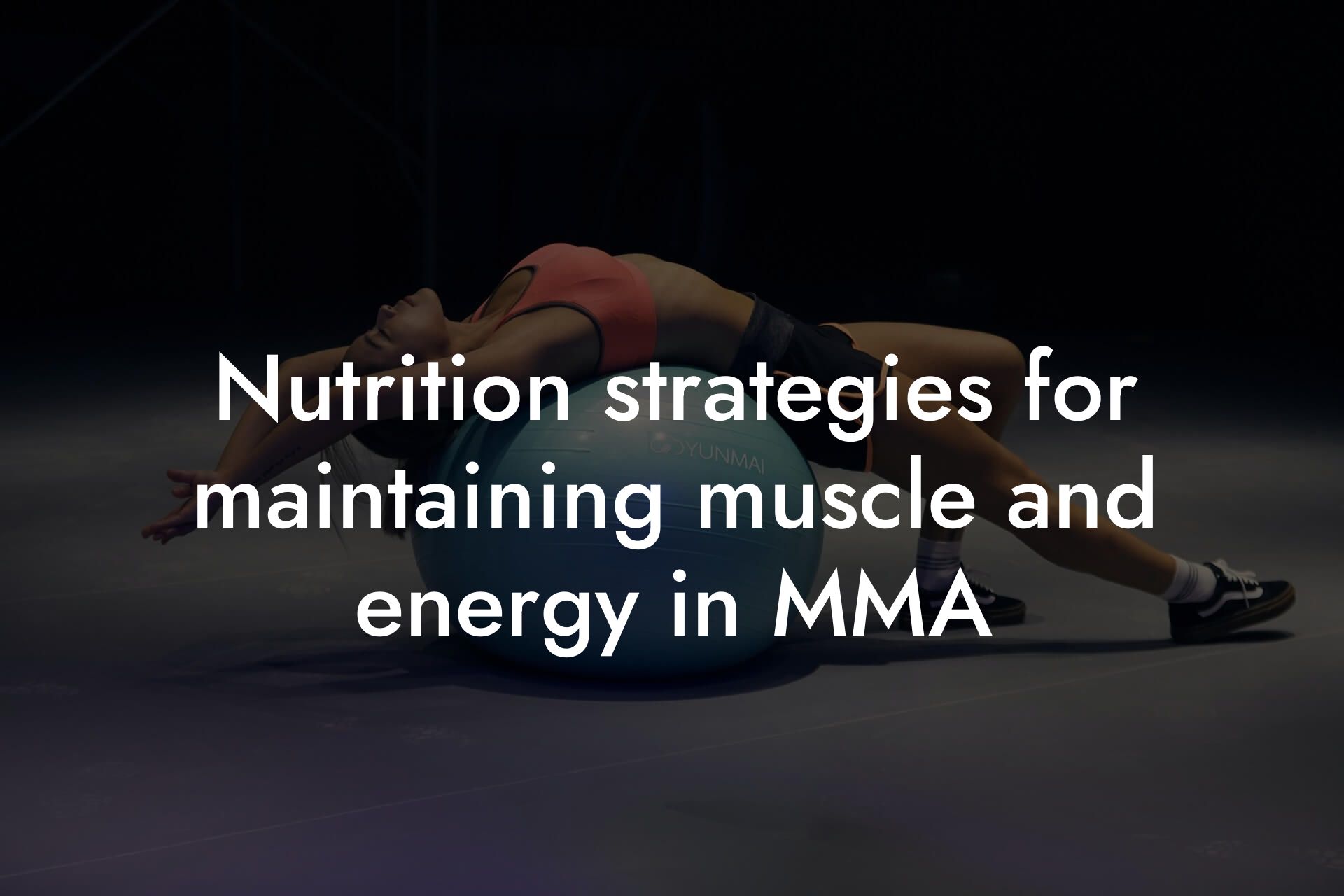As an MMA fighter, achieving and maintaining an optimal weight class is crucial for performance, safety, and overall success in the sport. Reducing body fat is a critical component of this process, but it requires a deep understanding of the complex relationships between body composition, nutrition, and training. In this article, we'll delve into the world of body fat reduction for MMA fighters, exploring the importance of optimal body fat percentage, the risks of excessive body fat, and providing a comprehensive guide on how to reduce body fat for optimal weight class performance.
Table of Contents
- Why Body Fat Percentage Matters in MMA
- The Risks of Excessive Body Fat in MMA
- Optimal Body Fat Percentage for MMA Fighters
- Macronutrient Balance for Body Fat Reduction
- Meal Frequency and Timing for Body Fat Reduction
- Hydration and Body Fat Reduction
- Training Strategies for Body Fat Reduction
- Supplementation and Body Fat Reduction
- Frequently Asked Questions
Why Body Fat Percentage Matters in MMA
In MMA, body fat percentage plays a significant role in determining a fighter's overall performance. Excess body fat can hinder a fighter's speed, agility, and endurance, making it more challenging to execute complex techniques and withstand the physical demands of a fight. On the other hand, a leaner physique can improve power-to-weight ratio, allowing fighters to generate more force relative to their body weight. A lower body fat percentage also enhances recovery between fights, as excess fat can impede the body's ability to dissipate heat and recover from intense physical activity.
The Risks of Excessive Body Fat in MMA
Carrying excess body fat can have severe consequences for MMA fighters. Not only can it impact performance, but it can also increase the risk of injury and decrease overall health. Excess body fat is linked to a range of health problems, including insulin resistance, cardiovascular disease, and certain types of cancer. In MMA, excess body fat can also lead to decreased mobility, reduced reaction time, and impaired cardiovascular endurance, making it more challenging to compete at a high level.
Optimal Body Fat Percentage for MMA Fighters
The optimal body fat percentage for MMA fighters varies depending on factors such as weight class, age, and individual goals. Generally, a body fat percentage between 6-12% is considered optimal for male MMA fighters, while female fighters typically aim for a body fat percentage between 16-23%. However, these are general guidelines, and the ideal body fat percentage will depend on individual circumstances. A DEXA scan can provide a precise measurement of body fat percentage, allowing fighters to tailor their training and nutrition strategies accordingly.
Macronutrient Balance for Body Fat Reduction
A well-balanced diet is essential for reducing body fat and achieving optimal weight class. MMA fighters should focus on consuming a balanced ratio of macronutrients, including protein, carbohydrates, and healthy fats. A general guideline is to aim for:
- 1.6-2.2 grams of protein per kilogram of body weight
- 2-3 grams of complex carbohydrates per kilogram of body weight
- 0.5-1 gram of healthy fats per kilogram of body weight
Aim to adjust macronutrient ratios based on individual needs and goals, and prioritize whole, nutrient-dense foods over processed and high-calorie options.
Meal Frequency and Timing for Body Fat Reduction
Meal frequency and timing play a critical role in reducing body fat and achieving optimal weight class. MMA fighters should aim to eat 4-6 meals per day, spaced out every 2-3 hours, to maintain a stable energy balance and support muscle growth and recovery. Post-workout nutrition is particularly important, as it helps to replenish energy stores and promote muscle recovery. Aim to consume a balanced meal or snack containing protein and complex carbohydrates within 30-60 minutes after training.
Hydration and Body Fat Reduction
Adequate hydration is essential for body fat reduction and overall health. MMA fighters should aim to drink at least 8-10 glasses of water per day, with an additional 16-20 ounces of water consumed 30 minutes before training. Proper hydration helps to boost metabolism, support energy production, and enhance recovery. Additionally, drinking water can help to suppress appetite and reduce cravings for unhealthy snacks.
Training Strategies for Body Fat Reduction
A well-structured training program is critical for reducing body fat and achieving optimal weight class. MMA fighters should focus on a combination of strength training, cardio, and high-intensity interval training (HIIT) to optimize fat loss and improve overall fitness. Aim to include exercises that target multiple muscle groups at once, such as squats, deadlifts, and bench press, and incorporate cardio exercises like running, jumping rope, or cycling. HIIT involves short bursts of high-intensity exercise followed by brief periods of rest, and can be an effective way to burn fat and improve cardiovascular endurance.
Supplementation and Body Fat Reduction
While a well-balanced diet and training program are essential for body fat reduction, certain supplements can help to support the process. MMA fighters may consider adding the following supplements to their regimen:
- Protein powder: Helps to support muscle growth and recovery
- BCAAs (branched-chain amino acids): Supports muscle growth and recovery, and can help to reduce muscle soreness
- Green tea extract: Boosts metabolism and enhances fat loss
- Conjugated linoleic acid (CLA): Supports fat loss and improves body composition
However, it's essential to consult with a healthcare professional or registered dietitian before adding any new supplements to your regimen, as they can interact with medications or have adverse effects in certain individuals.
Reducing body fat for optimal weight class in MMA requires a comprehensive approach that incorporates a balanced diet, strategic training program, and targeted supplementation. By understanding the importance of body fat percentage, the risks of excessive body fat, and the optimal body fat percentage for MMA fighters, athletes can take the first step towards achieving their goals. With the guidance of a DEXA scan and a tailored training and nutrition program, MMA fighters can optimize their body composition, enhance their performance, and reach new heights in their careers.
Frequently Asked Questions
What is the ideal body fat percentage for MMA fighters?
For MMA fighters, the ideal body fat percentage varies depending on the weight class and individual goals. Generally, a body fat percentage between 6-13% is considered optimal for most weight classes. However, fighters may need to adjust their body fat percentage based on their specific weight class and performance goals.
How do I calculate my body fat percentage?
There are several methods to calculate body fat percentage, including skinfold measurements, bioelectrical impedance analysis (BIA), and dual-energy X-ray absorptiometry (DXA). At Tano Performance Group, we recommend working with a qualified healthcare professional or certified trainer to determine your body fat percentage using a reliable method.
What are the benefits of reducing body fat for MMA fighters?
Reducing body fat can improve overall performance, increase speed and agility, and enhance endurance. It can also improve mental focus and confidence, leading to better fight outcomes. Additionally, reducing body fat can reduce the risk of injury and improve overall health.
How do I reduce body fat for optimal weight class in MMA?
A comprehensive approach to reducing body fat involves a combination of proper nutrition, consistent training, and recovery strategies. Focus on consuming a balanced diet with adequate protein, healthy fats, and complex carbohydrates, while also increasing your caloric expenditure through regular cardio and strength training.
What is the role of nutrition in reducing body fat for MMA fighters?
Nutrition plays a critical role in reducing body fat for MMA fighters. A well-planned diet should provide adequate macronutrients, micronutrients, and hydration to support training and recovery. Focus on whole, unprocessed foods, and avoid excessive sugar, salt, and unhealthy fats.
How many calories should I consume to reduce body fat?
The ideal caloric intake for reducing body fat varies depending on individual factors such as weight, height, age, and activity level. A general guideline is to create a caloric deficit of 500-1000 calories per day through a combination of diet and exercise. However, it's essential to consult with a qualified healthcare professional or registered dietitian to determine your specific caloric needs.
What are the best foods for reducing body fat?
Foods rich in protein, healthy fats, and complex carbohydrates are ideal for reducing body fat. Include lean protein sources like chicken, fish, and eggs, as well as healthy fats like avocados, nuts, and seeds. Complex carbohydrates like whole grains, fruits, and vegetables provide sustained energy and support overall health.
How often should I train to reduce body fat?
Aim to train at least 3-4 times per week, with a combination of cardio, strength training, and high-intensity interval training (HIIT). Increase the frequency and intensity of your training as you get closer to your fight date.
What is the importance of strength training for MMA fighters?
Strength training is essential for MMA fighters to improve overall power, speed, and endurance. Focus on exercises that work multiple muscle groups at once, such as squats, deadlifts, and bench press.
How can I incorporate HIIT into my training routine?
HIIT involves short bursts of high-intensity exercise followed by brief periods of rest. Examples of HIIT workouts include sprints, burpees, jump squats, and mountain climbers. Incorporate HIIT into your training routine 2-3 times per week to improve cardiovascular fitness and burn fat.
What is the role of recovery in reducing body fat?
Recovery is critical for reducing body fat, as it allows your body to repair and adapt to the physical demands of training. Ensure adequate sleep (7-9 hours per night), incorporate stretching and foam rolling, and prioritize rest days to allow your body to recover.
How can I manage stress to reduce body fat?
Chronic stress can lead to increased cortisol levels, which can hinder fat loss. Engage in stress-reducing activities like meditation, yoga, or deep breathing exercises to manage stress and support overall health.
Can I reduce body fat too quickly?
Yes, reducing body fat too quickly can be detrimental to overall health and performance. Aim to lose 1-2 pounds per week for a sustainable and healthy approach to fat loss.
How do I maintain weight loss after reaching my goal?
Maintaining weight loss requires a long-term commitment to healthy habits. Focus on sustainable lifestyle changes, including a balanced diet and regular exercise, to maintain weight loss and optimize overall health.
What are the risks of extreme weight cutting?
Extreme weight cutting can lead to dehydration, electrolyte imbalances, and decreased performance. It can also increase the risk of injury and negatively impact overall health. Avoid extreme weight cutting and focus on sustainable weight loss strategies.
How can I stay hydrated during weight loss?
Adequate hydration is critical for overall health and performance. Aim to drink at least 8-10 glasses of water per day, and increase hydration during intense training periods.
What are the benefits of working with a coach or trainer?
Working with a coach or trainer can provide personalized guidance, support, and accountability. They can help you develop a customized training and nutrition plan tailored to your specific needs and goals.
How can I track my progress?
Regularly track your progress through measurements, weight, body fat percentage, and performance metrics. Use a food diary or mobile app to track your nutrition and stay accountable.
What are the common mistakes MMA fighters make when trying to reduce body fat?
Common mistakes include extreme weight cutting, inadequate nutrition, and insufficient recovery. Avoid these mistakes by focusing on sustainable weight loss strategies and prioritizing overall health and performance.
How long does it take to see results from reducing body fat?
Results from reducing body fat can vary depending on individual factors such as starting body fat percentage, training, and nutrition. Aim to lose 1-2 pounds per week for a sustainable and healthy approach to fat loss, and be patient with your progress.
Can I reduce body fat without sacrificing muscle mass?
Yes, it is possible to reduce body fat without sacrificing muscle mass. Focus on a balanced diet with adequate protein, and prioritize strength training exercises to maintain muscle mass.
What are the benefits of reducing body fat for overall health?
Reducing body fat can improve overall health by reducing the risk of chronic diseases such as heart disease, diabetes, and certain types of cancer. It can also improve mental health and overall well-being.
How can I stay motivated during the weight loss process?
Stay motivated by setting realistic goals, celebrating small victories, and finding a support system. Surround yourself with like-minded individuals who share your goals and values, and stay focused on your why.
Here are some related articles you might love...
- Nutrition strategies for maintaining muscle and energy in MMA
- Strength and conditioning programs for MMA fighters
- Off-season training and conditioning for MMA fighters
- The role of DEXA scans in MMA training and weight management
- The importance of lean muscle mass in MMA performance
- Recovery techniques for MMA athletes after fights
- How body composition affects performance in MMA
- Balancing power, speed, and agility in MMA training
- Bone density and injury prevention in MMA
Zak Faulkner
Zak Faulkner is a leading authority in the realm of physical health and body composition analysis, with over 15 years of experience helping professionals optimise their fitness and well-being. As one the experts behind Tano Performance Group, Zak has dedicated his career to providing in-depth, science-backed insights that empower clients to elevate their physical performance and overall health.
With extensive knowledge of DEXA technology, Zak specializes in delivering comprehensive body assessments that offer precise data on body fat, muscle mass, bone density, and overall physique. His expertise enables individuals to make informed decisions and achieve their fitness goals with accuracy and confidence. Zak’s approach is rooted in a deep understanding of human physiology, combined with a passion for helping clients unlock their full potential through personalised strategies.
Over the years, Zak has earned a reputation for his commitment to excellence, precision, and client-focused service. His guidance is trusted by top professionals who demand the best when it comes to their health. Whether advising on fitness programs, nutritional strategies, or long-term wellness plans, Zak Faulkner’s insights are a valuable resource for anyone serious about taking their health and fitness to the next level.
At Tano Performance Group, Zak continues to lead our Content Team revolutionising how professionals approach their physical health, offering unparalleled expertise that drives real results.




